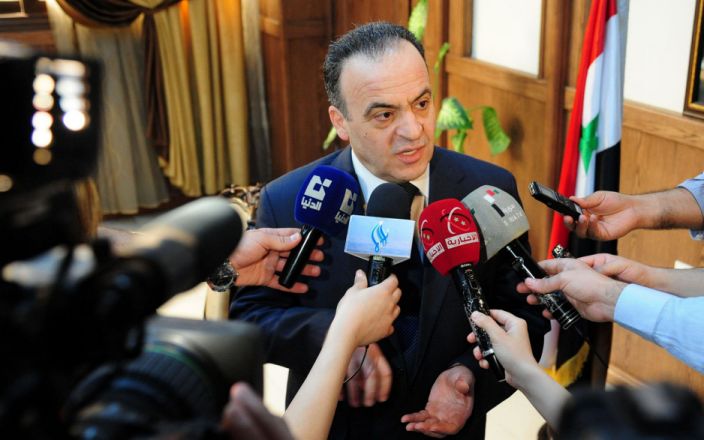Turkey’s troubled neighbor Syria, which has been roiled in a bloody civil war for almost a decade, is now facing economic collapse. Despite vey low official Covid-19 case figures, experts suspect the epidemic is at leats as bad in the country, as it is in Iraq. Falling oil revenues and the soaring expense of caring for the sick has emptied the coffers of Iran and Russia, reducing financial aid going to Damascus. Experts suspect the Assad regime is no longer indispensable for his junior patron, Mr Putin. Instability in the country and Assad’s demise are important considerations for Turkey, the president of which Erdogan hates Assad, while the country has 4 occupied zones at its border with Syria to force Assad into a peace agreement which would allow 4 million Syrian refugees to go home. Assad’s misfortune could be Turkey’s gain.
Bashar al-Assad, the Syrian dictator, sacked his prime minister on Thursday amid a spiraling economic crisis and a series of rare protests against his regime.
In a statement, the office of the Syrian president announced that Imad Khamis, who had served as prime minister since 2016, had been dismissed
“President Assad issues decree number 143 for year 2020 which relieves the prime minister Imad Muhammad Dib Khamis of his position,” it said.
The dismissal came as a highly unusual mass protest against Assad continued for its fifth consecutive day in the Druze-majority town of Suweida in southwestern Syria.
Dozens marched through the town calling for the “fall of the regime” as well as revolution and justice. Similar protests were held this week in the southern town of Tafas, in the Daraa region.
“Protesters called for freedom and toppling of the regime as a result of popular anger over the deteriorating economic, social, security and political situation,” one protester in Suweida, Noura al Basha, told Reuters news agency.
Most of Syria’s Arab Druze community has stayed loyal to the Assad regime for fear of religious persecution, while Suweida has largely avoided the bloodshed of the civil war.
Public protests against Assad’s rule since the civil war began are almost unheard of due to the risk of being “disappeared” into the country’s prisons and torture chambers by security forces.
Syrian President Bashar Assad gestures during an interview in Damascus – SANA
Syrian President Bashar Assad gestures during an interview in Damascus – SANA
The Syrian regime swiftly announced Khamis was being replaced by Hussein Arnous, who previously served as housing and water resources minister.
Senior Syria analysts said both Mr Hussein and Mr Khamis were regarded as “unpopular and corrupt” politicians in the country.
Mr Khamis, who like most senior Syrian figures is under EU sanctions, oversaw a catastrophic plunge in the value of the Syrian pound. As of Thursday, 3,000 Syrian pounds were valued at $1, or 79 pence.
Syrian authorities blame the economic hardship on Western sanctions, while the currency collapse has led to soaring prices and people struggling to afford food and basic supplies.
But it was speculated on Thursday that Mr Khamis may have been sacked so he could take the blame for the economic crisis.
Assad is also grappling with a feud in Syria’s ruling family, which erupted earlier this year when his cousin, a former member of the inner circle, published an unprecedented video begging for debt relief.
In the video, which is said to have angered the Syrian dictator, telecoms businessman Rami Makhlouf claimed he had been saddled with crippling debts by Assad and claimed he was unable to pay them off.
Since 2015, Turkey has launched four major military operations in war-torn Syria alongside allied Syrian rebel groups and Islamist militias.
Turkey conducts intermittent air strikes in northern Iraq targeting the outlawed Kurdistan Workers’ Party, an armed militant group that has been fighting for Kurdish self-rule in Turkey for over three decades.
Turkey is the gainer from turmoil
Opposition-controlled areas in northern Syria are switching to the Turkish Lira in response to the rapid depreciation of the Syrian Pound.
Areas of Aleppo and Idlib, under control by Turkish-backed oppositional groups, witnessed large quantities of Turkish Lira circulating in markets after the opposition coalition government announced the formal adoption of the Turkish Lira in an effort to stabilise the local economy.
The decision to replace the Syrian Pound had come in a statement on Tuesday issued by the President of the Syrian Provisional Government, Abd al-Rahman Mustafa, reported TRT World.
You can follow our English language YouTube videos @ REAL TURKEY: https://www.youtube.com/channel/UCKpFJB4GFiNkhmpVZQ_d9Rg
And content at Twitter: @AtillaEng
Facebook: Real Turkey Channel: https://www.facebook.com/realturkeychannel/
